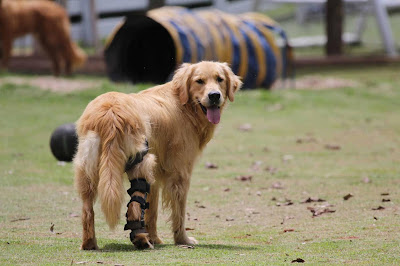Types of Arthritis Found in Dogs
Arthritis, which simply means inflammation of the joints, can affect dogs in a variety of ways. Osteoarthritis, often known as canine arthritis, is the most frequent type of arthritis in dogs. Dogs are more vulnerable to arthritis than horses or cats, and it typically manifests itself in one of several ways:
1. Osteoarthritis
It is a chronic degenerative joint condition that causes a slow, cumulative degradation of cartilage in your dog's joints. When a joint's cartilage wears away, the adjacent bones begin to rub against one another, producing muscular stiffness and joint pain.
2. Hip Dysplasia
Hip dysplasia is a deformation of the hip sockets. The uneven deformity of the "ball and socket" allows for excessive mobility in the joint, resulting in muscle soreness, chronic inflammation, tissue degradation, and the sometimes production of calcium deposits. Hip dysplasia is especially common in larger dog breeds.
3. Elbow Dysplasia
Another type of dysplasia can be detected in the elbows of large breed dogs. This condition is usually inherited. Elbow dysplasia causes the bones to become deformed, causing chipping with use and causing discomfort and agony. Suffering from this illness will be limp in the affected dog leg.
4. Knee Dysplasia
This joint deformity can be observed in the knees. Knee dysplasia comprises the same "small bones" that cause pain and stiffness as the condition worsens.
5. Torn Ligaments in the Stifle Joint (Knee)
Torn ligaments in the Dog Stifle cause joint instability. A typical consequence of the stifle knee is joint dislocation. The stifle joint is exposed to a large amount of wear and tension, making inflammation at this site typical. The most serious cause of these problems is inadequate or improper breeding techniques.
6. Osteochondrosis
Cartilage inflammation, or osteochondrosis, is directly related to poor breeding. An inadequate diet can aggravate this problem as well. Osteochondrosis symptoms include discomfort and inflammation, as well as cartilage degradation.
7. Kneecap Dislocation
Kneecap dislocation occurs when the kneecap continuously shifts and pulls out of its appropriate joint position and is related to poorly formed leg bones. Once again, this is a problem caused by inadequate breeding or inherited characteristics.
If left untreated, arthritis can be a highly severe condition in dogs. Owners should keep a watchful eye on their dogs and act quickly if signs appear. The most important thing is to identify and diagnose the problem before deciding on the appropriate treatment.


Comments
Post a Comment